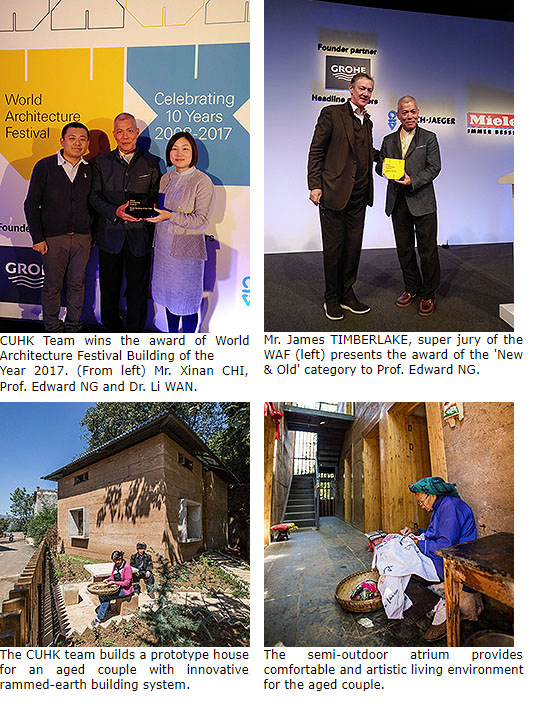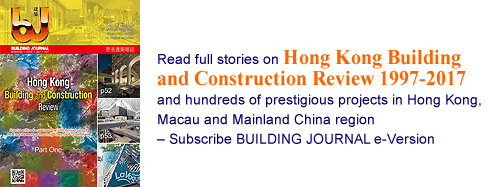|
|||
| HONG KONG | <Search <Archives <eBulletin | ||
November 29, 2017 CUHK Rural Architectural Project wins top international award An anti-seismic earth house built by the One University One Village (1U1V) team at The Chinese University of Hong Kong (CUHK) has been awarded the World Building of the Year 2017 at the World Architecture Festival (WAF) — ‘the Oscars of architecture’. This is the first time an architecture team in Hong Kong has won this prestigious award. The prototype house constructed for an aged couple in Yunnan demonstrates how traditional methods can be improved to provide villagers safe, affordable, comfortable, and sustainable homes. It also shows that architecture can be enjoyed by the poor as much as the rich.
The house in Guangming Village claimed the title of World Building of the Year, and was described as ‘extraordinary’ by WAF judges for addressing profound problems ordinary people face. It was built in response to the Ludian earthquake in 2014, which left 617 people dead and thousands homeless. Employing an innovative rammed-earth construction technique, the prototype house has not only provided a safe and comfortable home for the aged couple, but also rebuilt the confidence of the villagers in traditional rammed-earth buildings. The project was led by Prof. Edward Ng, Yao Ling Sun Professor of Architecture, Dr Li Wan, and PhD student Xin’an Chi at the School of Architecture, CUHK, and carried out in collaboration with Dr Emily So of the University of Cambridge and Prof Wenfeng Bai of the Kunming University of Science and Technology. The team conducted a research on the shortfalls of traditional rammed-earth buildings to formulate a new rammed-earth system. After repeated tests, they completed a 148 sq m, two-storey, new, rammed-earth house in four months, using local material and with the help of local workers. The construction cost of the new earth house was 600 RMB/sq m, 40% less than the cost of brick-concrete buildings in the village (1,000-1,500 RMB/sq m). The house is affordable and sturdy, as it stood undamaged when two subsequent earthquakes hit. WAF judges applauded the re-use of traditional material and construction methods but with the addition of new technology – combining ancient wisdom with modern know-how. They were also impressed by the iterative research process which could be re-applied to anywhere in the world affected by seismic problems and low levels of wealth. ‘This building is a demonstration that architecture is just as relevant in the poorest of communities as it is in the richest,’ said Mr. Paul Finch, WAF Programme Director. The 2017 World Architecture Festival was hosted in Berlin, Germany. It received 924 entries from 68 countries around the world. The submitted projects ranged from family homes to schools, stations, museums, large infrastructure and landscape projects. Of the entries, 434 were shortlisted and nominated to present at the Arena in Berlin. The three-day festival attracted over 2,000 architects from across the globe. CUHK's anti-seismic earth house won the Old & New category Award to become one of the 18 finalists. On the last day of the festival, the grand-jury (Super Jury) awarded the 1U1V team the WAF World Building of the Year Award. The project has also previously won the Architectural Review (AR) House Awards 2017 for its deep understanding of local society and cost-effective construction template for the community. Website: www.1U1V.org  |
|



